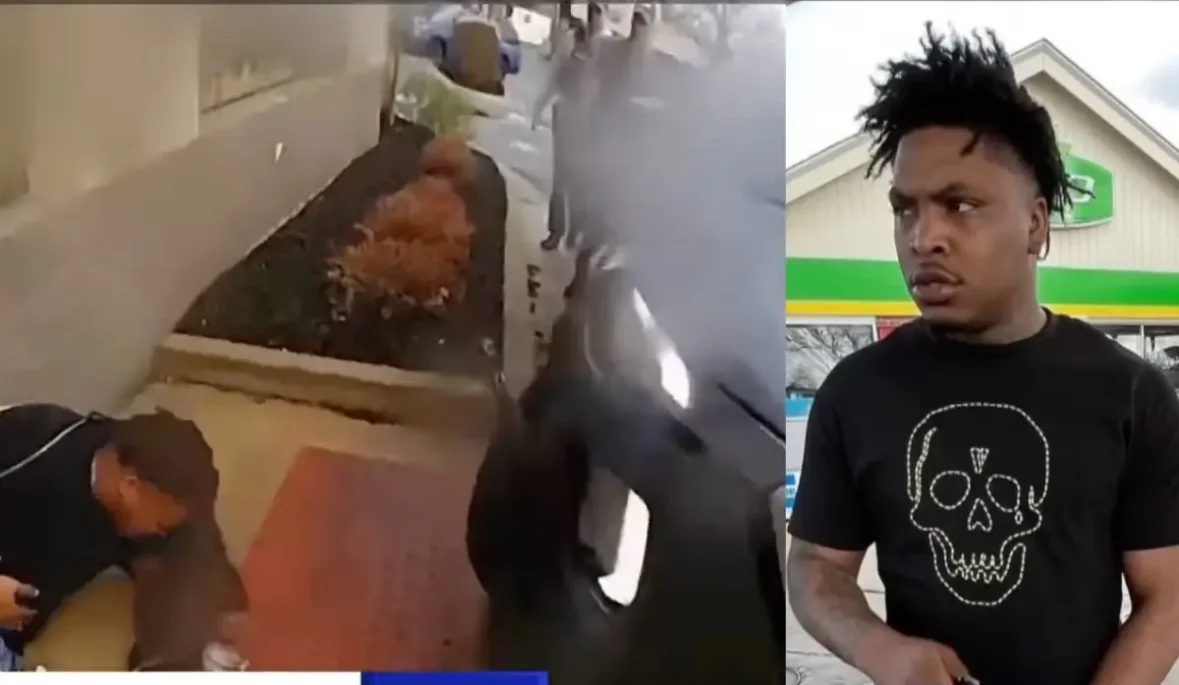A white Michigan state trooper was charged with second-degree murder and involuntary manslaughter this week for striking and killing a Black man with his SUV while pursuing him for a probation violation last month.
Michigan State Police Sgt. Brian Keely is facing up to life in prison for killing Samuel Sterling, a 25-year-old father of two who was known locally as a rap artist. The incident took place on April 17 while Keely was working with a federal U.S. Marshals Service task force along with several other officers from different agencies.
Sterling, who was pumping air into his tires at a gas station when he was confronted by police, took off running on foot, prompting Keely to pursue him in his unmarked SUV along with several other officers on foot and in their patrol cars.

A security video from a local Burger King shows Sterling was running on a sidewalk when Keely drove his vehicle over the curb and struck him, pinning him between the SUV and the wall of the fast food restaurant. He was pronounced dead hours later at a local hospital.
“I’ve got no gun,” said Sterling, who was crying out in pain, according to body camera footage released a month after the incident. “Why you hit me like this?”
Sterling was asked to put his hands behind his back before the officers realized he was in severe anguish. His hands were cuffed in front of his body instead.
Several officers held Sterling down while one officer placed a knee in his back for about 10 seconds. The officers told Sterling, who was unarmed, to not to reach for anything.
EMT arrived on the scene within 5 minutes. “Did the car bump into the building or did he actually get pinned between the vehicle and the building?” one asked.
“Both,” the officer responded.
When an EMT asked Sterling for his first name, he replied with his last name.
“I can’t even think,” Sterling said in agony. “Bro, please help me. Please help me.”
Realizing that their suspect if fully incapacitated, the officers change their tone.
“They’re coming. Just relax,” one officer said. “Just catch your breath.”
“Just breathe. Don’t move, man,” another officer said. “…We don’t want you moving your back.”
The initial footage from Burger King was released last month by attorneys representing Sterling’s family, who include Ben Crump, a nationally renowned attorney who has represented the families of many Black men killed by police in high-profile incidents over the years.
Michigan State Police released 15 minutes of footage weeks later, consisting of bodycam and dashcam videos from the officers present—none of which give a clear view of the incident or come from Keely or his patrol car.
Police say in a media release that Keely was not wearing a body camera “due to his assignment on a federal task force,” but the U.S. Marshals Service has implemented policies requiring all officers working on task forces to use body cameras while serving warrants and arresting fugitives.
However, the federal policy, which began in 2020, has been implemented slowly in regional phases over the last several years and does not go into effect in Michigan until the second quarter of 2025, according to the U.S. Marshals Service website.
However, Michigan State Police have also implemented policies requiring officers to wear body cameras as well as patrol cars to be outfitted with dash cameras, and those policies went into effect on March 14, 2024, a month before the incident.
Nevertheless, the existing footage provided enough evidence for the Michigan Attorney General to file charges against Keely, 50, a 25-year police officer.
“Detective Sergeant Keely’s actions that day were legally, grossly negligent and created a very high risk of death or great bodily harm, which could have otherwise been prevented,” according to a statement issued by Michigan Attorney General Dana Nessel on Tuesday when she announced the charges to the media.
More than two weeks before the charges were announced, two former longtime police chiefs and police training consultants reviewed the footage from Burger King at the request of a local television news station and determined the officer violated the law.
“No matter what the trooper said he was doing and why his vehicle jumped up over the curb onto the sidewalk and struck the suspect, it’s still going to be a criminal matter. It’s an involuntary homicide at the very least,” Roy G. Taylor told Wood-TV last month.
“Sterling was not posing a threat of serious bodily harm or death to anyone at the time of the incident, so there was not an immediate need for his apprehension and the use of a vehicle to chase down a fleeing suspect on foot was not a reasonable action,” added Melvin L. Tucker.
The second-degree murder charge is punishable by up to life in prison if convicted, but sentencing will be up to the judge, who has wide discretion as to what he would serve, according to Michigan law.
Sterling’s warrants stemmed from previous arrests for being a felon in possession of a firearm and carrying a concealed weapon, according to local media sources who reviewed his records. He violated probation by possessing marijuana and leaving the state without permission from his probation officer.
Sterling’s mother, Andrica Cage, said she cried with happiness when learning of the charges, but it still does not ease the pain of losing her son.
“It’s never going to be relief to me,” she told Michigan Live. “With my son gone, I haven’t been right since. That’s a pain I wouldn’t wish that on my worst enemies.”


